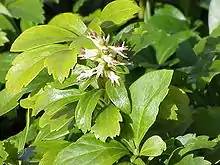Pachysandra terminalis
Pachysandra terminalis, the Japanese pachysandra,[1] carpet box[2] or Japanese spurge, is a species of flowering plant in the boxwood family Buxaceae, native to Japan, Korea and China and introduced to eastern North America.[3] It is a slow-growing, spreading evergreen perennial growing to 10 cm (4 in) tall by 60 cm (24 in) broad, with alternate, simple, glossy leaves, and creeping stems. The leaves may yellow in direct sunlight or in winter. When growing in a spreading mass of many plants, a dense cover is formed.
| Pachysandra terminalis | |
|---|---|
 | |
| Closeup—inflorescence and foliage. | |
| Scientific classification | |
| Kingdom: | Plantae |
| Clade: | Tracheophytes |
| Clade: | Angiosperms |
| Clade: | Eudicots |
| Order: | Buxales |
| Family: | Buxaceae |
| Genus: | Pachysandra |
| Species: | P. terminalis |
| Binomial name | |
| Pachysandra terminalis | |
The flowers are white, borne above the foliage. In temperate Northern Hemisphere sites they appear late in the month of March and throughout the month of April. The plant is very cold hardy.
The specific epithet terminalis means "ending", and refers to the clusters of leaves which appear at the end of the short stems.[4]
Cultivation
Pachysandra terminalis is cultivated as an ornamental plant, for use as a massed groundcover, low grouped element, or accent plant in the ground. It is a suitable lower plant for container gardening, and shaded or "northside" window boxes. It takes about three years to establish a solid groundcover in suitable climates, when new plantings are spaced 15–30 cm (6–12 in) apart. It spreads by new stems sprouting from the spreading root system.
The plant prefers a moist and well-drained soil that is both acidic and rich. A humus amended loam (acidic pH) soil, with regular organic fertilizer applications and watering-rainfall is optimal. However, the plant is tolerant of neutral to slightly alkaline pH soils, and to periodic dryness, especially in humid and non-arid climates.
Cultivars
Numerous cultivars have been developed for garden use, of which 'Variegata'[5] has gained the Royal Horticultural Society's Award of Garden Merit.[6]
Propagation
Pachysandra terminalis can be propagated by dividing and transplanting clumps, by rooting stem cuttings, or by removing seedlings that have grown through the spread of roots from the main flower.
References
- USDA, NRCS (n.d.). "Pachysandra terminalis". The PLANTS Database (plants.usda.gov). Greensboro, North Carolina: National Plant Data Team. Retrieved 30 January 2016.
- BSBI List 2007 (xls). Botanical Society of Britain and Ireland. Archived from the original (xls) on 2015-06-26. Retrieved 2014-10-17.
- "Pachysandra terminalis". County-level distribution map from the North American Plant Atlas (NAPA). Biota of North America Program (BONAP). 2014.
- Harrison, Lorraine (2012). RHS Latin for gardeners. United Kingdom: Mitchell Beazley. p. 224. ISBN 9781845337315.
- "RHS Plant Selector - Pachysandra terminalis 'Variegata'". Retrieved 16 January 2021.
- "AGM Plants - Ornamental" (PDF). Royal Horticultural Society. July 2017. p. 71. Retrieved 14 April 2018.
External links
- Missouri Botanical Garden: Pachysandra terminalis (Japanese pachysandra) — horticulture information.